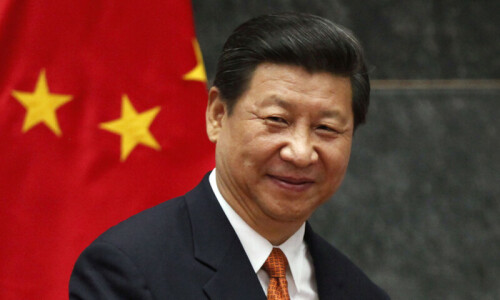MOSCOW: The Kremlin raised stakes further in the standoff over Ukraine on Tuesday by saying that the recognition of two rebel-controlled regions in the country’s east, announced the previous day, extends even to the large parts of these administrative units now held by Ukrainian forces.
Kremlin’s spokesman Dmitry Peskov said Russia had recognised the two regions’ independence in borders that existed when they proclaimed their independence in 2014 — broad territories that extend far beyond the areas now under rebel control and that include the major Black Sea port of Mariupol.
Putin’s move to recognise the territories’ independence opened the door for him to formalise his hold on them and send forces in, though Ukraine and its Western allies have charged Russian troops have been fighting there for years.
US terms it ‘beginning of an invasion’; European powers announce sanctions on Moscow
On Tuesday, lawmakers gave President Putin permission to use military force outside the country — a move that could presage a broader attack on Ukraine after the US said an invasion was already under way there.
Late on Monday, convoys of armoured vehicles were seen rolling across the separatist-controlled territories.
Members of Russia’s upper house, the Federation Council, voted unanimously to allow Putin to use military force outside Russia, effectively formalising a Russian military deployment to the rebel regions.
West in a fix
The White House on Tuesday began referring to Russian troop deployments in eastern Ukraine as an invasion after initially hesitating to use the term, a red line that President Joe Biden has said would result in the US levying severe sanctions against Moscow.
“We think this is, yes, the beginning of an invasion, Russia’s latest invasion into Ukraine,” Jon Finer, principal deputy national security adviser, said in an interview on CNN. “An invasion is an invasion and that is what is under way.” The White House decided to begin referring to Russia’s actions as an invasion because of the situation on the ground, according to a US official.
“The US president made clear that if Russia invaded Ukraine, we would act with Germany to ensure Nord Stream 2 does not move forward,” White House press secretary Jen Psaki said.
The European Union and Britain announced on Tuesday that some of those measures were coming.
Ukrainian President Volodymyr Zelensky said he would consider breaking diplomatic ties with Russia and Kyiv recalled its ambassador in Moscow.
But confusion over what exactly was happening in eastern Ukraine threatened to hobble a Western response. While the US clearly called it an invasion, some other allies hedged.
“Russian troops have entered Donbas,” the name for the area where the two separatist regions are located, the European Union’s foreign policy chief Josep Borrell said in Paris. “We consider Donbas a part of Ukraine.”
Poland’s defence ministry and British Health Secretary Sajid Javid also said Russian forces had entered Ukraine’s east, with Javid telling Sky News that the invasion of Ukraine has begun.
Sanctions
In response to the moves thus far, top EU officials said the bloc was prepared to impose sanctions on several Russian officials and banks financing the Russian armed forces and move to limit Moscow’s access to EU capital and financial markets. .
British Prime Minister Boris Johnson said the UK would slap sanctions on five Russian banks and three wealthy individuals.
While he said that Russian tanks have already rolled into eastern Ukraine, he warned a full-scale offensive would bring further powerful sanctions.
Published in Dawn, February 23rd, 2022
















































